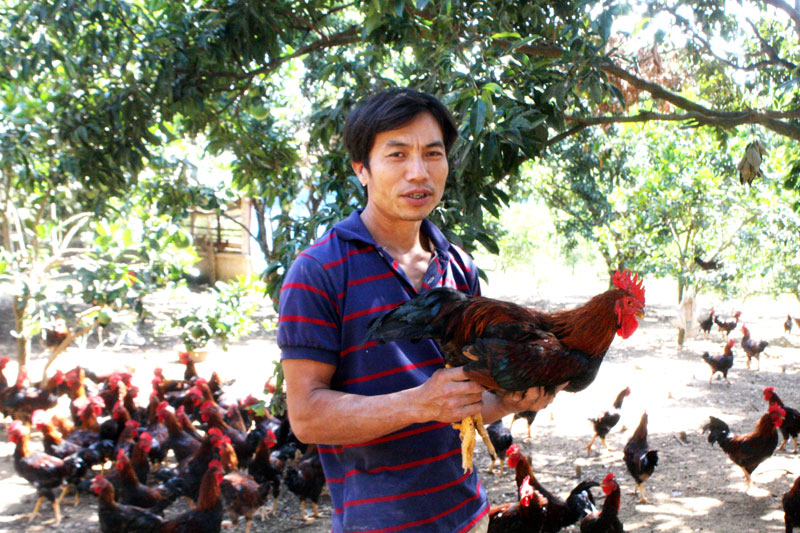
(HBO) - With a large hill garden and determination to get rich in the homeland, Tran Dinh Liem, a farmer in Dong De village, Dong Tam commune, Lac Thuy district, has reaped successes when putting his trust in Lac Thuy chickens.

Photo: Tran Dinh Liem in Dong De village, Dong Tam commune,
Lac Thuy district, has been successful thanks to the model of Lac Thuy chicken
farming.
In early 2010, Dong Tam commune strongly developed
chicken farming model in Lac Thuy. Many households have converted their gardens
and hills to farms to raise chickens. Lac Thuy chickens with delicious meat has
quickly become popular, opening up promising development opportunities for
local farmers.
Seeing high economic efficiency, Liem invested in
cages to raise chickens. On a flat and wide litchi garden, he used B40 steel
mesh divided into six areas to breed chickens.
In the first batch, he raised 3,000 hatches.
Despite difficulties such as the lack of experience in caring and preventing
epidemics for chickens, he still achieved successes. The first batch of
chickens was sold at high prices, giving him more capital to expand farming.
"It is a local variety which must be raised
free-range so that a large area is needed. I raise chickens and learn
experience from other households, books and newspapers so I do not meet much
difficulties”, Liem said.
According to him, his family raised up to 12,000
chickens at the highest per batch. Now, there are 4,000 chickens which could be
sold in the next 10 days. Apart from raising chickens for meat, he raises another
2,000 for laying eggs. Last year, he sold nearly 7 tonnes of chicken, earning
roughly 300 million VND. He is raising 2,000 breeding chickens.
"Compared to other fowls, Lac Thuy chicken is
quite appropriate because it is popular in the market. There are many farming
households but their connectivity is weak. For sustainable results, we hope to
establish a cooperative for mutual support and improve Lac Thuy chicken
trademark”, Liem said./.
Dao Village’s honey – a product certified with a 3-star OCOP (One Commune One Product) rating by Thong Nhat Agricultural Cooperative in Dao Village (Hoa Binh City) – is highly regarded by consumers for its quality, richness, and variety in packaging. The distinctively sweet taste of Dao Village’s honey leaves a lasting impression on anyone who has tried it.
In alignment with Project No. 07-DA/TU, issued by the Hoa Binh provincial Party Committee on November 1, 2021, Lac Thuy district has actively promoted investment and supported the sustainable development of its industrial and handicraft sectors during the 2021–2025 period. Alongside this, the district has remained committed to preserving and revitalising traditional craft villages.
Located in the northern part of Lac Thuy district, with a temperate climate and fertile soil, Phu Thanh commune has great potential and advantages in growing tea. The long-standing experience, combined with strict adherence to organic farming practices in the tea gardens, ensures that the dried tea products from Phu Thanh and Lac Thuy as a whole are sold out immediately upon production, providing a stable and prosperous life for the local people.
Amid efforts to streamline the administrative apparatus, Hoa Binh province has intensified measures to address challenges in land clearance, resettlement support, and infrastructure investment, aiming to speed up the progress of key projects.
Hoa Binh province has posted an unprecedented economic growth rate of 12.76% in the first quarter of 2025, marking its highest quarterly performance to date and positioning it as the second fastest-growing locality in the country, trailing only Bac Giang province.
Under current regulations, products in the One Commune – One Product (OCOP) programme that are rated three stars or higher must undergo re-evaluation every three months. However, in reality, some of these products fail to consistently meet the required standards, raising concerns about the sustainability of their OCOP certification. This underscores the urgent need for producers to enhance product quality and gradually develop their OCOP products into strong, marketable brands.



